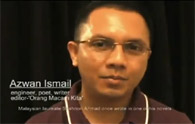The 32-year-old is the only Malay Muslim gay man in the line-up of 14 other gay and lesbian Malaysians featured in the video campaign, as featured on Fridae last week. The other Muslims include a bisexual, two transgender people and a straight person.

In the 3-minute clip, Azwan Ismail spoke in Malay about coming out as gay as being particularly difficult because of "religious and cultural factors (that) have defined our lives, telling us who we can be and who we can't."
Azwan was quoted as saying in an AP report that he has tried to avoid going out alone or lingering at public places after a few of the 3,000 people who commented on his video issued death threats while many others criticised his decision to go public.
Over the weekend, the video clip made newspaper headlines in the Muslim-majority country with Datuk Seri Jamil Khir Baharom, a Minister in the Prime Minister’s Department, calling on the religious authorities to monitor the activities of gay groups.
“For Muslims, we must remember that being gay is against our religious teaching,” he was quoted in the local media on Sunday as saying. “We want this activity to be monitored closely by the authorities and appropriate actions to be taken to prevent it from spreading as it can tarnish the image of Islam.”
In a statement released on Monday, Seksualiti Merdeka, producer of the video clips, said they “never intended to tarnish the image of Islam” but “simply wanted to give hope” to young Malaysians growing up with lesbian, gay, bisexual, transgender (LGBT) or confused feelings on their sexual orientation.
In response to the minister’s remarks, organisers of the campaign asked why didn’t he “also ask JAKIM to supervise Muslims who post abusive and vulgar comments which threaten people with violence and death.”
“The honorable minister’s primary concern is the image of Islam being tarnished. We too never intended to tarnish the image of Islam. We simply wanted to give hope. However, we feel that Islam’s image can also be tarnished by those who speak with hate and intolerance, completely without a trace of humanity and understanding.”
Seksualiti Merdeka, a coalition of NGOs including the Bar Council Malaysia, SUARAM, Matahari Books, Empower, PT Foundation, United Nations, Amnesty International, and other individuals which also produces an annual sexuality rights festival of the same name, called on Malaysian leaders and the public to “not ignore threats of physical violence.”
The statement read in part: “Besides preventing meaningful discourse and debate, these threats also further intimidate fellow Malaysians who are already fearful for their well-being. We believe in respectful exchange of perspectives in Malaysia if we are truly a nation that celebrates diversity, dynamism, and creativity. If LGBT Malaysians are given avenues to express ourselves, we are certain the public will be more understanding and realise we are not a threat to society.
“The intolerant and vicious comments prove that Malaysia is a hostile environment preventing any LGBTs from leading honest, open and meaningful lives. This vicious cycle of shame and intimidation needs to be broken once and for all. The pressure in having to pretend to be something we are not and the loneliness and fear that comes with it often results in a misery that may push some to the verge of suicide.
“And that is why, more than ever, we need messages of hope such as that by Azwan Ismail: “I am confident that things will be better. We have to gather our strengths from around us because there people who can help us and give us the confidence to be ourselves, to face our future...”
Meanwhile here are the two new videos released this week featuring university student Kavidha and Pastor Joe Pang.
Kavidha, who is 21 and straight, told Fridae in an email interview what motivated her to participate in this project: "I believe in equality and human rights for all. As a science student, psychological articles on why people are BORN gay appealed to me because I have a lot of gay friends who deal with a lot of obstacles because of who they are. Not everyone has friends to tell them that 'it's okay, it gets better' so I took part in this project to do that for someone.
“If just one person, especially a Malaysian LGBT, who sees any of these videos and starts thinking that they can do this, that they are just as entitled to life and success as the next person, then this project has achieved something. And that's worth more than all the nasty comments all of us have been receiving.”
